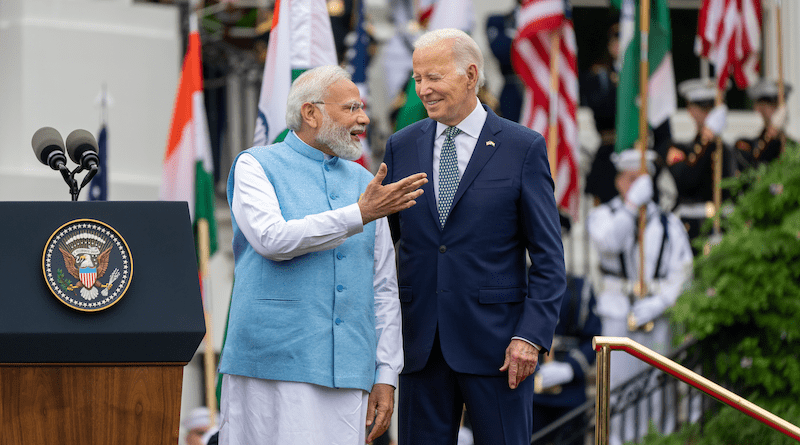India-US Relations In 2023: Advancing Amid New Problems – Analysis
By Institute of South Asian Studies
By C Raja Mohan
United States (US) President Joe Biden’s decision to decline Indian Prime Minister Narendra Modi’s invitation to attend the annual Republic Day celebrations in January 2024 has been interpreted as a ‘snub’ to India amidst the US’ allegations of official Indian involvement in the effort to assassinate a Sikh separatist leader and an American citizen, Gurpatwant Singh Pannu, earlier this year.
Biden’s participation in the prestigious Republic Day was to be followed by a summit of the Quadrilateral Security Dialogue (Quad) forum with the prime ministers of Australia and Japan. It is India’s turn in 2024 to host a Quad summit – in the series that began in Washington in September 2021. Biden’s presence at the Republic Day and the Quad summit would have capped a triumphal season of diplomacy at the end of Modi’s second term as prime minister. His campaign for a third term, starting in the summer of 2024, is all set to roll forward in the coming weeks.
Senior officials from the US have insisted that there was no political motivation in the Biden’s decision not to travel to India in January 2024 and that there was no connection with the Pannu case. Yet, the idea of an American ‘put down’ of Modi has gained much currency in Indian and western media.
The US National Security Adviser, Jake Sullivan, told the media the problem was the tight demand on the president’s time, stating, “Due to scheduling demands, we notified Indian officials that the president would be unable to visit India in late January”. Sullivan, however, made it clear that the visit to India and a Quad summit could take place later in the year.
Sullivan added that he had “witnessed first-hand” the “close personal bond” between Biden and Modi, as well as their “shared commitment to advancing the aspirations of their people for a prosperous future”. “The president remains personally committed to carrying forward this partnership, which he has often described as the most consequential partnership for the US over the century unfolding”, Sullivan said.
On the Indian side, Modi, in an interview with the Financial Times, put the speculation on the setback to India-US relations at rest. He declared that the partnership between India and the US is “broader in engagement, deeper in understanding, warmer in friendship than ever before.”
The perception of a crisis in India-US relations was more about the public discourse than an objective reality. Seen from the perspective of the 21st century, the India-US relationship has continued to defy the persistent pessimism about its prospects. Since the visit of US President Bill Clinton to India in March 2000, there has been a steady forward movement in the bilateral relationship.
Successive governments in the two capitals have devoted significant political and diplomatic energy to elevate the bilateral partnership to higher levels. The last three decades have seen the two sides overcome some long-standing problems in the relationship. These included the Kashmir question and the US activism on the issue that rocked bilateral ties in the 1990s.
The US also ended an ‘even-handed’ policy towards Pakistan and India by de-hyphenating the two relationships and facilitating the construction of an independent relationship with India. If the US’ policy towards Asia was focused on building a strong relationship with China from the 1980s to the early 2000s, India has emerged as an important new partner for the US in constructing a new regional order in Asia.
Delhi and Washington resolved the intractable non-proliferation dispute through the historic civil nuclear initiative during 2005-08. The US has eased a range of export controls on sensitive civilian and military technology transfer to India under the new bilateral initiative on Critical and Emerging Technologies, signed in 2023. India-US bilateral trade (including goods and services) crossed US$190 billion (S$251 billion) in 2022, making Washington the largest trading partner for Delhi.
Compared to the difficulties that have been overcome in the last two decades, the Pannu case appears less challenging. However, there is no question that the case has arrested Washington’s growing trust in India. That Indian officials might undertake an assassination attempt on the soil of its most important strategic partner clearly grates on the nerves of many US supporters of a strong partnership with India.
Questions have been raised in the US Congress on India’s extra-territorial actions on American soil. The Modi government, on its part, has begun to investigate the matter. All the five Indian-American members of the US Congress welcomed the enquiry by Delhi. Still, they warned that “it is critical that India fully investigates, hold those responsible, including Indian government officials, accountable, and provide assurances that this will not happen again.”
Although much of the commentary focused on the negative dynamic arising from the Pannu episode, there is no missing the fact that the two sides have taken great care to address the issues at hand with considerable sensitivity. Reports from Washington suggest that “The US is banking on India to institute correctives and will sustain and deepen ties. India knows this action was reckless and will have to take steps to recover trust.”
Given the high stakes in the bilateral relationship, neither side is interested in letting the Pannu case undermine the hard-won partnership over the last quarter of a century. It would be reasonable to assume that Delhi and Washington will find ways to limit the damage from the Pannu case in 2024 while building on the many new initiatives for bilateral cooperation unveiled in 2023.
- About the author: Professor C Raja Mohan is a Visiting Research Professor at the Institute of South Asian Studies (ISAS), an autonomous research institute at the National University of Singapore (NUS). He can be contacted at [email protected]. The author bears full responsibility for the facts cited and opinions expressed in this paper.
- Source: This article was published by the Institute of South Asian Studies (ISAS)

